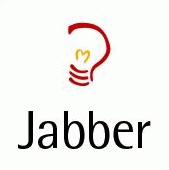 Enough of reviews, philosophy, and literature, its time to switch to the tech , the next best thing to 'naked' ;)
Enough of reviews, philosophy, and literature, its time to switch to the tech , the next best thing to 'naked' ;)Recently I read some white papers and related stuff on the emerging IM (Instant Messaging) technology called Jabber/XMPP (Extensible Messaging and Presence Protocol), though not a popular one, it has come into limelight after Google used it in its Gtalk IM client. Jabber is basically a set of XML related protocols with XMPP at its core, for real time IM and comprises of other protocols also apart from XMPP. Jabber to IM, is similar to what TCP is to networking, Java is to Programming, HTML is to web and IMAP is to E-mail, in the sense that it aims to spread interoperability between different kinds of existing IM services and highlight the importance of real time in IM. Being a decentralized and open source tech it gives developers freedom to put in what all they think can be useful in terms of IM.
One of the biggest stresses of jabber/xmpp is on providing the presence information to its users available on different resources. Resources are the mediums through which a user connects to a jabber server, like Mobiles, PDAs or Desk/Laptops, essentially providing users the freedom to be concurrently logged on with the same user name from different locations/resources. The intelligent structure of the protocol then makes it possible for the server to pass on the data to relevant resources only, thereby increasing the possibility of the message to reach its recipient in time. The use of XML for data binding and transport dispenses the implicit hassles and technicalities involved in most of the existing IM protocols, because XML is a human readable format and definitely more easier to work with.
So, where does it lack? What has prevented its growth and popularity, and puts it at the last in IM tech stack? Foremost of all the reasons, is that Jabber/XMPP is just a novice amongst the big sharks of the IM industry. Yahoo, AIM, ICQ and MSN have already set the trend long back and distributed the market pie, each almost owning the piece of it with them. XMPP was popular only amongst free lance and interested developers who took it up for experimental purposes and built clients for their own use. It was because of Google's spree of doing unique things, which leveraged its potential use and brought it to the forefront of competition with other IM softwares. And now when it has rivaled its competitors I guess Jabber/XMPP will gradually become no less than a threat to the existing IM companies, forcing them to either switch their technology or at least provide a support for it.
Though providing enhancement for multimedia support in terms of VoIP and P2P multimedia sessions using XMPP is one of the major issues as of now, but the JSF(Jabber Software Foundation) has already made its move with JEP(Jabber Enhancement Proposal) to provide a complete, standard and robust extension protocol for the same in the form of Jingle which was published recently towards the end of last year, as an alternative solution for both, IETF's Session Initiation Protocol (SIP), and the ITU's H.323 technology. Gtalk uses a hardcore C++ API LibJingle for its VoIP capability, which itself as the name suggests is based on the Jingle-Audio and Jingle-Signalling.
Jabber is increasingly becoming a favorite choice amongst corporates as they realize the need for a personal IM system for their enterprises. With its highly secured IM capabilities and easier maintenance and setup cost Jabber XCP is the only enterprise level IM solution available today. This has already triggered participation from more players in this new potential market of IM solutions for enterprises.
And no doubt with Google disseminating Jabber/XMPP, and arousing interest amongst the IM users and developers about this new trend setter, XMPP has a long way to go.

1 comment:
thanks.very informative. dint know that gtalk utilzes a different tech than YM..even though i wondered why its fast and clear.
I see oracle is doing good things to u.
Post a Comment